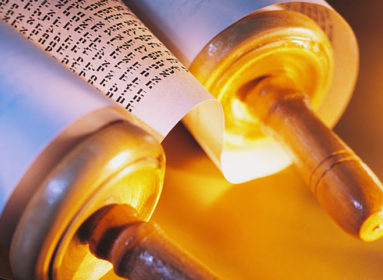
By Rabbi Tzvi Hersh Weinreb
Let me tell you about a lesson I learned in a most unusual setting—a small meeting room in the White House, just outside the door to the Oval Office of George W. Bush, who was then president of the United States. I was part of a delegation of rabbis who had come to thank the President for expediting emergency disaster relief funds to be delivered to religious schools and to inform him of some of the political concerns of the American Jewish community.
President Bush is a devoutly religious man, so it was no wonder that one member of our group felt that it was perfectly appropriate to recite a prayer in his presence. He explained to the President that he would be reciting a prayer traditionally reserved for kings and heads of state. The President bowed his head and listened very reverentially as my colleague pronounced these words: “Blessed art Thou, Hashem, our Lord and Master of the universe, who has granted some of His glory to a creature of flesh and blood.” The President, his head still bowed, fervently responded, “Amen.”
The President then lifted his head and faced the rabbi who had pronounced the prayer. “I thank you for those sacred words, Rabbi,” he said. “But,” he objected, “I noticed that you blessed the Almighty. You didn’t bless me! Don’t you think that I could use a blessing or two?”
Most of the group laughed – and one member of our group swiftly recited an alternate prayer, one which did indeed bless the President and not the Almighty.
Soon afterwards, I found myself consulting a verse near the conclusion of this week’s Torah portion, Tetzaveh: “And they shall know that I am the Lord their God who has taken them from the land of Egypt so that I might abide among them” (Exodus 29:46). Rashi renders that last phrase a bit more sharply: “…in order for Me to abide among them.” Two major medieval commentators expand upon Rashi’s translation. Ramban and, even more emphatically, Rabbeinu Bahya assert that our verse is conveying an astonishing message, one that on first blush sounds like nothing short of heresy. They understand that the Almighty proclaimed that He took the nation of Israel out of slavery not letzorech hedyot, for the sake of ordinary humans, but rather letzorech gavoha, for His own sake, for the need of the Most High.
Does the Almighty need man? Are we to believe that the master of the universe has selfish motives for His divine actions? Did He free the nation of Israel from bondage for His own satisfaction, and not for the sake of His people?
These very questions are also asked, albeit in a more erudite fashion, by one of the most sophisticated Jewish thinkers of the past generation, Rabbi Simcha Zissel Broyda, the Dean of the Hebron Yeshiva in Jerusalem. His answer, which is recorded in a remarkable essay found in his masterpiece Vesam Derech, is a lengthy one. But his main argument can be paraphrased as follows: There are two ways in which a gift can be given. One is simple and direct: the donor gives the recipient a precious object. But there is another way: If the recipient is a person of great prestige and unusual stature and he consents to accept a gift from the donor, he has in effect given a gift to the donor – because the donor is so pleased and honored that the recipient has deigned to accept his paltry gift that he feels as if he is the recipient and not the donor. When a great man accepts my gift, he has given me a gift.
Rabbi Broyda argues that this is the way it is with the Almighty. He accepts our gifts of worshipful acts as if He needs them for His own sake, as if He “personally” can benefit from them. When we worship Him, and He accepts our worship, we do not feel that we have given Him. We feel that we have received!
Thus, in the verse from this week’s Torah portion, the Almighty tells us that He delivered us from Egypt for His own sake so that “I might abide among you,” as if He needed to abide among us. But we naturally feel that by expressing His eagerness to accept our companionship, He has given us His greatest gift.
These thoughts led me to formulate a response to the President’s remarks, although I admittedly have not had the opportunity to share it with him (yet!). The Almighty permits us to bless Him in our prayers, for He knows full well that by blessing Him, we will feel blessed—nay, we will be blessed!
As we recite any of the many blessings that are part of the daily routine we would do well to recall this interpretation of the blessings we recite. Yes, we bless God for our bread, our water, our health, and our wisdom. But let us recognize that when He accepts our puny blessings, we receive His blessing, and that is, by far, the greatest gift of all.
Rabbi Tzvi Hersh Weinreb is executive vice president emeritus of the Orthodox Union.








 Southern New England Jewish Ledger
Southern New England Jewish Ledger












